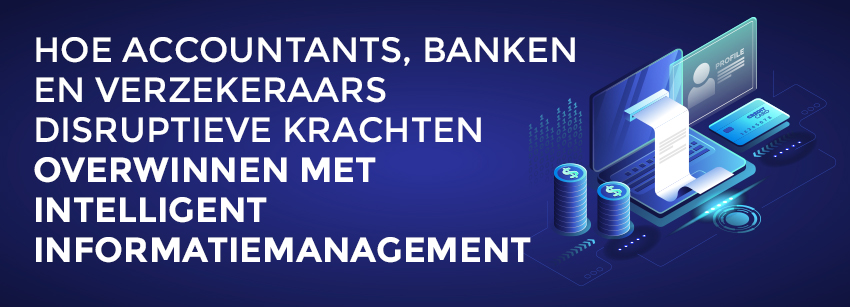It is no secret that banks, accountants and insurers are struggling with their information management and this is putting pressure on their livelihoods. They are facing several disruptive developments in their sectors. How can accountants, banks and insurers maintain their right to exist?
PricewaterhouseCoopers In their information management survey, these sectors say the following:
"Financial service providers, accountants and insurers are stuck with their information management. Old systems, processes and relationships make innovation extremely difficult, even as new technology drives up user expectations and attracts new competitors in their market. Many organisations are still struggling with their digital transformation, even as their future growth depends on it."
Many of the disruptive forces facing these service providers put enormous pressure on their growth, progress and quest for greater efficiency. Accountants, financial service providers and insurers are struggling in many cases with the following issues:
- All their information management systems have been built up over the years.
- Massive mergers and acquisitions after the 2008 crash created the enormous challenge of integrating and rationalising the existing systems of various merged organisations.
- Huge investments in "repository-centric" content management that resulted in a strategy focused on where a document is rather than what kind of document it is.
- Rising legislative and regulatory requirements directly related to how information is managed and by whom.
- New fintechcompetitors (Amazon, Alibaba, WeChat, Apple, Google) seeking particularly profitable business models over existing players. Business models capable of modernising legacy technologies.
- A new generation of "digital native" banks, accountants and insurers with a totally different customer approach from traditional players.
An AIIM survey of executives in these sectors confirms this:
91% of respondents said, "Our information management strategy needs to be modernised to meet modern challenges."
93% said, "Digitising and standardising business content is one of the key bottlenecks to our digital transformation.
57% stated, "My organisation is concerned that in the next 2 years we will face a serious disruption to our business model."
How should accountants, insurers and banks address these myriad challenges? They face a challenge that may be easier to solve than you might think.
Deloitte's Banking Outlook 2018 highlights the importance of maximising the productivity and effectiveness of their knowledge workers and changing their efforts from repetitive work to work that creates more value: "These service providers will need to re-educate their employees to work collaboratively while providing them with more integrated employee experiences - from recruitment to retirement - to reflect the richer experience their customers demand."
Below are two facts from the AIIM survey on the tools used daily by knowledge workers:
On average, 58% of the unstructured information used in business systems (such as ERP, HR, Finance, CRM and Project Management) is stored WITH those business systems (and thus is not available for other processes) INSTEAD of using a Content Management System.
Why this matters: Many legacy content management systems were designed around customisation, large volumes and processes. These systems did the work within this process, but they were not designed for easy integration with other key business applications. The resulting silos of information in a single process and application-specific repositories now stand in the way of accountants, insurers and banks modernising their business processes for a customer experience anno now.
A key requirement for an intelligent information management solution is easy integration with business applications through content services which can be tailored to the needs of a particular process.
Almost 50% of accountants, banks and insurers describe their management of Microsoft Office documents (such as Word, Excel and PowerPoint) as "chaotic" or "unmanageable".
Why this matters: Elderly content management systems aim to somehow convince knowledge workers to put their work in the "right" repository and ensure that they are also assigned the right metadata along the way. Consolidation and the need to do more with fewer people in these sectors made this expectation totally unreasonable. As a result, much of the day-to-day business documents become unmanaged and stored without metadata.
This development often makes it impossible to find the right document when needed. Where was that file stored? Who edited it last? A modern approach to information management focuses on organising information based on what it is, rather than where it is stored. And to do this with attributes (metadata) that make sense to knowledge workers, artificial intelligence and machine learning is crucial. A modern platform automatically assigns metadata needed to make information findable, manageable and insightful.
The digital transformation of accountants, insurers and banks starts with simplifying the lives of their knowledge workers. They are increasingly strangled by the growing information chaos. Intelligent Information Management offers them the liberation they need to overcome disruptive development and players.
Curious about how Intelligent Information Management makes organisations resilient to disruptive developments and players? Take part in our webinar on Intelligent Information Management.
Bastiaan Brefeld
Intelligent Information Management Specialist
bastiaan.brefeld@geone.nl

